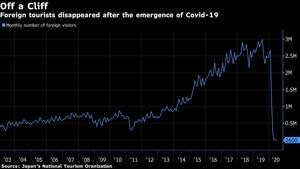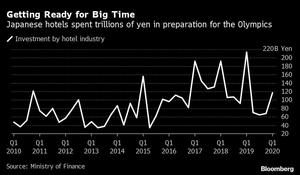 A Japanese houseboat, also known as yakatabune, sails past the Olympic Rings as seen from Odaiba Seaside Park in Tokyo on July 12, 2020. (PHILIP FONG / AFP)
A Japanese houseboat, also known as yakatabune, sails past the Olympic Rings as seen from Odaiba Seaside Park in Tokyo on July 12, 2020. (PHILIP FONG / AFP)
The Olympic cauldron will remain unlit and its stadium empty on Friday as the virus-triggered postponement of the Tokyo Games leaves disappointed fans wondering if it’s still worth holding on to tickets and hotel operators fretting over thousands of vacant rooms.
Japan will still mark the day originally scheduled for the opening ceremony with a national holiday. But there will be little to celebrate amid continued uncertainty over the feasibility of a revamped staging of the Games next year
Japan will still mark the day originally scheduled for the opening ceremony with a national holiday. But there will be little to celebrate amid continued uncertainty over the feasibility of a revamped staging of the Games next year.
Dylan Crain, a resident of Tampa, Florida who had tickets to attend Friday’s opening event, said he’d be less willing to go to a Games currently rescheduled to start on July 23, 2021.
ALSO READ: A year to go, uncertainty stalks rearranged Tokyo Games
The government had expected the Games to fuel a surge in overseas visitors to 40 million this year; now, it may not even reach 5 million. Spending by overseas visitors will be a fraction of the 4.8 trillion yen (US$44.7 billion) in 2019, with the failed Olympic bet threatening to re-entrench Japanese firms’ conservative stance on investment.
“This was supposed to be the busiest time for us ever,” said Naoyuki Fukuuchi, managing director at Japan Hotel Association. “Instead, we are in a dire situation like never before.”
ALSO READ: IOC remains 'fully committed' to staging Olympics in 2021
In a central bank survey earlier this month, sentiment among large hotel and restaurant owners nosedived to a record low of -91, the worst among any business category. Zero marks the dividing line between optimism and pessimism.
A number of big hotel chains including Prince Hotels & Resorts have delayed opening new facilities. A third of the 620,000 workers in the hotel industry were still on leave as of May, according to the ministry of internal affairs. But even with staff furloughed, some hotels haven’t had the reserves to weather the storm.

The White Bear Family Co. and its group companies, which ran hotels and sold travel packages, filed for bankruptcy protection with 35 billion yen in debt, a record case for Japan’s tourism industry, according to research firm Teikoku Databank.
Excessive competition in the Kansai region around Osaka and Kyoto and a drop in Korean and Chinese visitors amid political tensions had already made business hard, said Takuya Mori, an attorney at Kikkawa Law Offices in Osaka who represents WBF Hotels and Resorts.
“The coronavirus was the final blow and funds just ran out,” he added.

As part of Prime Minister Shinzo Abe’s collection of virus-response measures worth more than 40 percent of gross domestic product, the government has tried to focus some of its help on a tourism industry in distress, through a domestic travel program.
But looking beyond this summer, analysts see tourism recovering at a slow pace as Covid-19 keeps travelers wary. For would-be Olympic watchers, the dilemma is whether to hold on to tickets for a scaled-down Games next year, assuming the event will be held at all.

Victor Warren, who played hockey for Canada at the 1964 Tokyo Olympic Games, had planned to attend the Games this year with a fellow Olympian from 56 years ago, John McBryde, who won a bronze medal with the Australian hockey team.
Warren, 82, is determined to attend next year, come what may. “The Games are a life-altering experience, and something one will never forget,” he said.
READ MORE: Tokyo Games likely to be pared down, says JOC chief
But others have scrapped travel plans altogether. Emma Chirnside, a 29-year-old market researcher in Sydney, and her boyfriend had planned to come with another couple to root for a friend on Australia’s womens’ water polo team.


